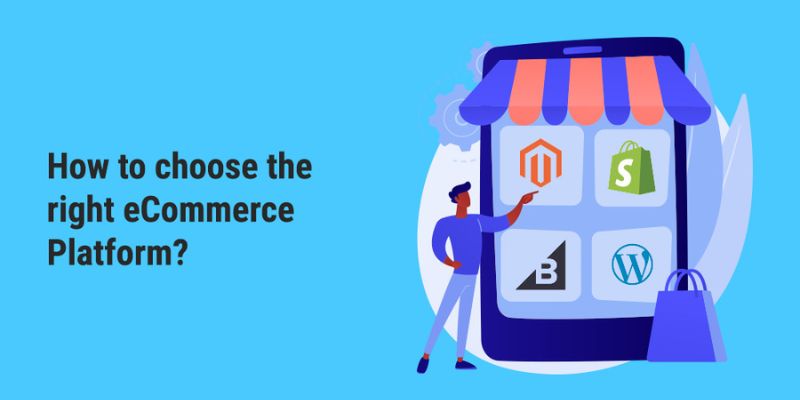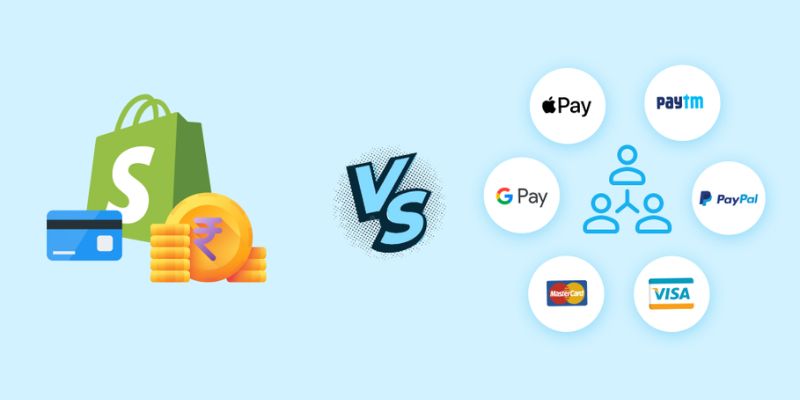Choosing the right e-commerce platform is a game-changer for your business. It’s the backbone of your online store, and getting it right means setting the course for success. It’s not just about picking the most popular one or the platform your friend recommends. You need a fit that aligns perfectly with your business needs, tech skills, and growth plans. It’s like finding the perfect pair of shoes: it has to fit well, look good, and last long. Let me guide you through the maze. We’ll consider your business size, the products you sell, and the technical resources at your disposal. We’ll dive into costs, making sure your choice stays friendly to your budget now and as you grow. You want features and a smooth shopping experience for your customers. And let’s not forget the lifelines – support and a strong community when you’re in need. This is your ultimate decision guide on how to choose an e-commerce platform – let’s step into a world of informed decisions.
Understanding Your Business Requirements
Assessing Business Size and Product Offerings
When picking an e-commerce platform, think about your business size first. Do you have a lot of products? Or just a few? Your platform should handle your current size and grow with you. Some are great for starters, while others fit big companies better. It’s about finding the right match.
Look at your products too. Do they need special features to show them off? Maybe you sell clothes or handmade goods. Each item might need choices like size or color. The platform you choose should make adding and changing these options easy.
Identifying Your Technical Expertise and Resource Availability
Next up, let’s talk tech skills. Do you have them? If you do, you might want an online shop you can tweak a lot. If not, you want something easy to use without needing to code. Your time matters here too. If you’re super busy, find a platform that’s quick to set up and manage. Can you hire help? That changes things. More hands on deck means you can go for a platform with more bells and whistles.
When you look into different platforms, see how much they cost. You don’t want to overspend, right? But also, cheap can mean fewer features. You need a good balance — enough features for a fair price. This keeps you from paying for stuff you don’t need.
Some platforms grow with your shop. This means as you sell more, they can handle it. They might let you add more products or take more visitors at once. This is what we call scalability. You want a platform that won’t slow you down when your shop gets popular.
Good customer support counts a lot. If your shop has a glitch, you want help, and fast! The best e-commerce solutions usually have strong support teams. They’re there for you when you need a quick fix or just some advice.
Setting up how you get paid is key. This is payment gateway integration. Your customers should find it easy to buy from you. And you need to get your money without a hitch. The easier this is, the happier everyone will be.
Also, think about other tools you might use. Stuff like email marketing or keeping track of how many items you have left. These are third-party e-commerce tools. The platform should work well with them, saving you from a headache later.
Great design pulls people in. Your online shop should look good on computers and phones. That’s having a strong e-commerce website design. It’s not just for looks. It makes shopping smooth and easy for everyone.
Don’t forget, having your shop show up on Google matters. So, SEO features in e-commerce platforms are super important. Good SEO helps people find you. When they search for what you sell, you want to pop up right away.
Last thing, keep it safe. People need to trust your shop with their card info. This is all about security protocols for e-commerce. The more secure your shop is, the more people will feel good about buying from you.

Analyzing Costs and Scalability
E-commerce Platform Costs Analysis and Budgeting
When I help you pick an online retail platform, we dig into costs first. Think about how much you will spend today and down the road. Factoring in e-commerce platform fees, consider both setup costs and ongoing expenses. This includes the price of the platform itself, any transaction fees, payment gateways, and third-party tools you’ll need.
Asking, “what will this cost me?” gets you a direct number to start. Then, we look at more details. We compare e-commerce software, checking which has the best deal to start and to grow. Think hard about what features you need straight away. Don’t pay more for things you won’t use yet.
Next up, we hunt for hidden costs. Added fees can sneak up on you, like charges for high sales volumes or extra charges for better customer support. Plus, not all platforms make setting up shop easy. Some make you hire a pro. That’s a big cost.
What about making money back? This means planning for a return on investment. I’ll guide you through this, to find a platform that fits your budget and pays off faster.
Considering Platform Scalability for Business Growth
Now, let’s chat about growth. Choosing a platform that grows with you is key. What’s platform scalability for an online shop? It’s how well the platform can handle more products, more sales, and more customers without breaking a sweat.
Small businesses dream big to become big enterprises one day. So, we pick a platform that’s just right; not too small, not too big. It’s like finding the perfect pair of shoes that still fits as you grow.
For growing shops, thinking about inventory management is a must. Can the platform keep up with your stock as you add more items? Don’t forget multi-channel selling, like connecting your shop to Amazon or eBay. More places to sell means more chances to earn!
You also want a smooth ride for your customers, no matter how busy you get. No customer likes slow loading speeds when they’re ready to buy. Your shop needs to be fast and easy to use, today and tomorrow. It’s like keeping the checkout line moving fast at a store during a sale.
A big question: Will the platform support the jump from a small shop to something bigger? It’s like having a small table at a food market and then moving to a full restaurant. The tools need to upgrade smoothly with you.
In summary, we don’t just look at now but at the whole journey ahead. Picking the right e-commerce solution is about making sure the fit is perfect for today’s budget and tomorrow’s dreams. You want to avoid switching platforms later—it’s a hassle and can be costly. Together, we’ll find a platform that grows with your business, not one that you’ll outgrow.

Evaluating Platform Features and User Experience
Payment Gateway Integration and Checkout Process
When picking an e-commerce platform, think about how customers will pay you. The payment part is big. Ask yourself, will the platform let my shop use popular payment methods? Yes, top platforms offer many payment choices. More payment options mean happy customers. Happy customers mean more sales for your shop.
More options also make checkout easy. A quick and smooth checkout keeps customers coming back. Think about it. No one likes waiting. Especially not when they are ready to buy. So, a simple checkout is a must. The best e-commerce solutions make checkout fast and easy. They let your customers pay how they want without any hassle.
Let’s talk safety now. Good payment systems protect your customer’s info. This is also called security. You want a platform that has top-notch security. Why is this so important? It builds trust. When customers trust you, they buy more. Find a platform that promises this. It’s like a safe that keeps all the money information locked tight.
Next is the cost. Some platforms charge more for each sale. This can add up. You want to keep more of what you sell, right? So, look for low transaction fees. A platform with low or no fees helps save money.
Lastly, your online shop needs to track what’s selling. Good platforms do this for you. They have inventory systems. These help you see how many items you have left to sell. Do not forget about this. It matters a lot. If you sell things you don’t have, customers get upset.
Analyzing SEO Features and Mobile E-commerce Capabilities
Now, let’s move on to getting found online. This is where SEO comes in. SEO helps your shop show up on Google. When folks search for what you sell, you want them to find you. That’s why SEO is so key. Look for e-commerce platform features that boost SEO. The best e-commerce solutions do this well.
Another big thing is shopping on phones and tablets. Many folks shop using their mobile gadgets. So, your online shop must work well on mobile too. This is called mobile e-commerce capabilities. Good platforms make shopping easy on any screen size. This means more sales. Because when it’s easy to shop from a phone, people shop more.
In picking a platform, you need to ask: How good is your site on mobile? Very good is what you need. It should look great and work fast. No one likes slow or hard-to-use sites. Especially on a small screen.
In short, getting these things right is not just nice to have. It’s a must. Payment options, security, SEO, and mobile shopping. These are the keys to a winning online shop. Choose a platform that does these really well. Then, watch your business grow.

Considering Support and Community Resources
Exploring Customer Support and User Communities
When selecting an online retail platform, think, “What if I get stuck?” You’ll want good help just a call or click away. The best e-commerce solutions offer reliable customer support for online stores. Chat with them. See if they’re quick and helpful. It’s your “Help!” button when sales are on the line.
Next, check for a strong user community. Here’s why: Other shop owners can offer tips and tricks. Such groups can be gold mines for troubleshooting. Plus, knowing you’re not alone in the online retail game? Priceless.
Reviewing Platform Updates, Security, and Compliance Standards
Now, let’s talk safety and keeping up-to-date. Check how often the platform updates its software. Regular updates mean fewer bugs and the latest features in your store.
Security is no joke. Look for security protocols for e-commerce on your chosen platform. Safe shopping equals happy customers. And PCI compliance for online stores? Non-negotiable. It keeps card info safe.
A great platform also adapts to law changes. This keeps your store out of legal hot water. Remember, safe and updated equals a store that thrives.
In this post, we’ve looked at how to pick the best e-commerce platform for your business. We started by looking at your business size, what you sell, and what skills and people you have. Next, we talked about the costs of these platforms and how they fit into your budget, and whether they can grow with your business.
We also went over the features of these platforms. We saw how they handle payments and if they make buying easy. And, we checked if they’re good for showing up in search engines and work well on phones.
Finally, we went over the help you can get. We looked at customer support, communities of other users, and how the platform stays safe and follows rules.
Choosing the right e-commerce platform is huge for your business. It needs to match what you can handle, help you grow, and be easy for shoppers. Take what you’ve learned here to make a smart choice. Your future sales and customers will thank you.
Q&A :
What factors should I consider when selecting an e-commerce platform?
Choosing the right e-commerce platform involves considering several key factors to ensure that it meets your business needs. You should evaluate things like the scalability of the platform, its ease of use, the level of customization available, its integration capabilities with other tools and services, the quality of customer support, pricing, and transaction fees, as well as the platform’s reputation and reliability. Make sure it also offers a secure shopping experience and is SEO-friendly to help your online store rank well in search engine results.
How important is scalability in an e-commerce platform?
Scalability is crucial when it comes to e-commerce platforms because it ensures that your online store can grow and handle increased traffic and sales without performance issues. It is important to choose a platform that can accommodate the growth of your product range and customer base, allowing you to add more functionality or bandwidth as needed. Opting for a scalable solution will save you the trouble of migrating to a larger platform later on, which can be costly and time-consuming.
Can the choice of an e-commerce platform affect my store’s SEO?
Yes, the choice of an e-commerce platform can significantly affect your store’s SEO. A platform that is optimized for search engines can help your site to rank higher in search results, which is crucial for attracting organic traffic. Key SEO features to look for include the ability to customize page titles and meta descriptions, create clean and search-friendly URLs, add and optimize content easily, and the platform’s ability to integrate with SEO tools and apps.
What is the difference between hosted and self-hosted e-commerce platforms?
The main difference between hosted (or cloud-based) and self-hosted e-commerce platforms is where the store’s data and files are stored. Hosted solutions host your store data on their servers and take care of maintenance, security, and updates for you. Self-hosted platforms require you to run your store on your own server, giving you more control but also increasing your responsibility for maintaining security, updates, and server performance.
How do I evaluate the cost-effectiveness of an e-commerce platform?
To evaluate the cost-effectiveness of an e-commerce platform, you’ll want to look at not just the initial setup fees and monthly hosting costs, but also the long-term expenses related to additional features, plugins, transaction fees, and maintenance. Budget for the resources you’ll need to manage the platform and consider the potential ROI based on the platform’s capabilities. Additionally, some platforms offer tiered pricing, so you can choose a plan that matches your current business needs while allowing for future expansion.

